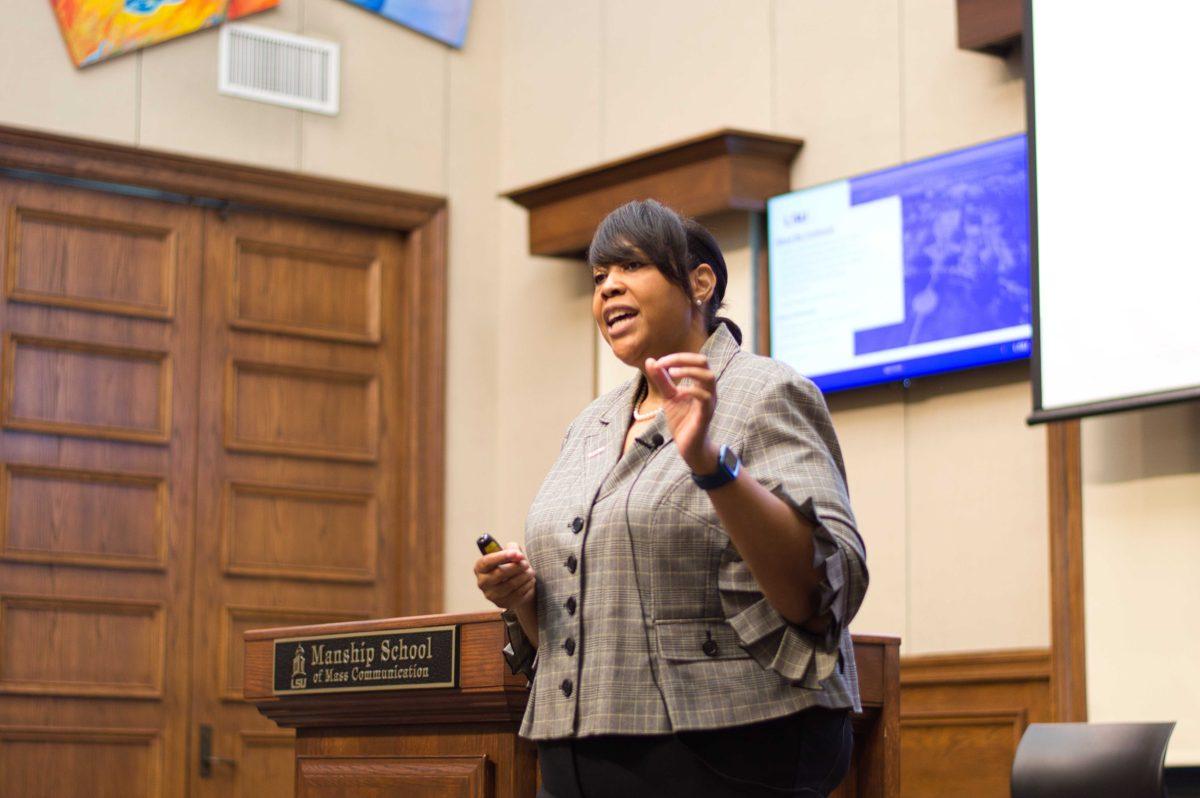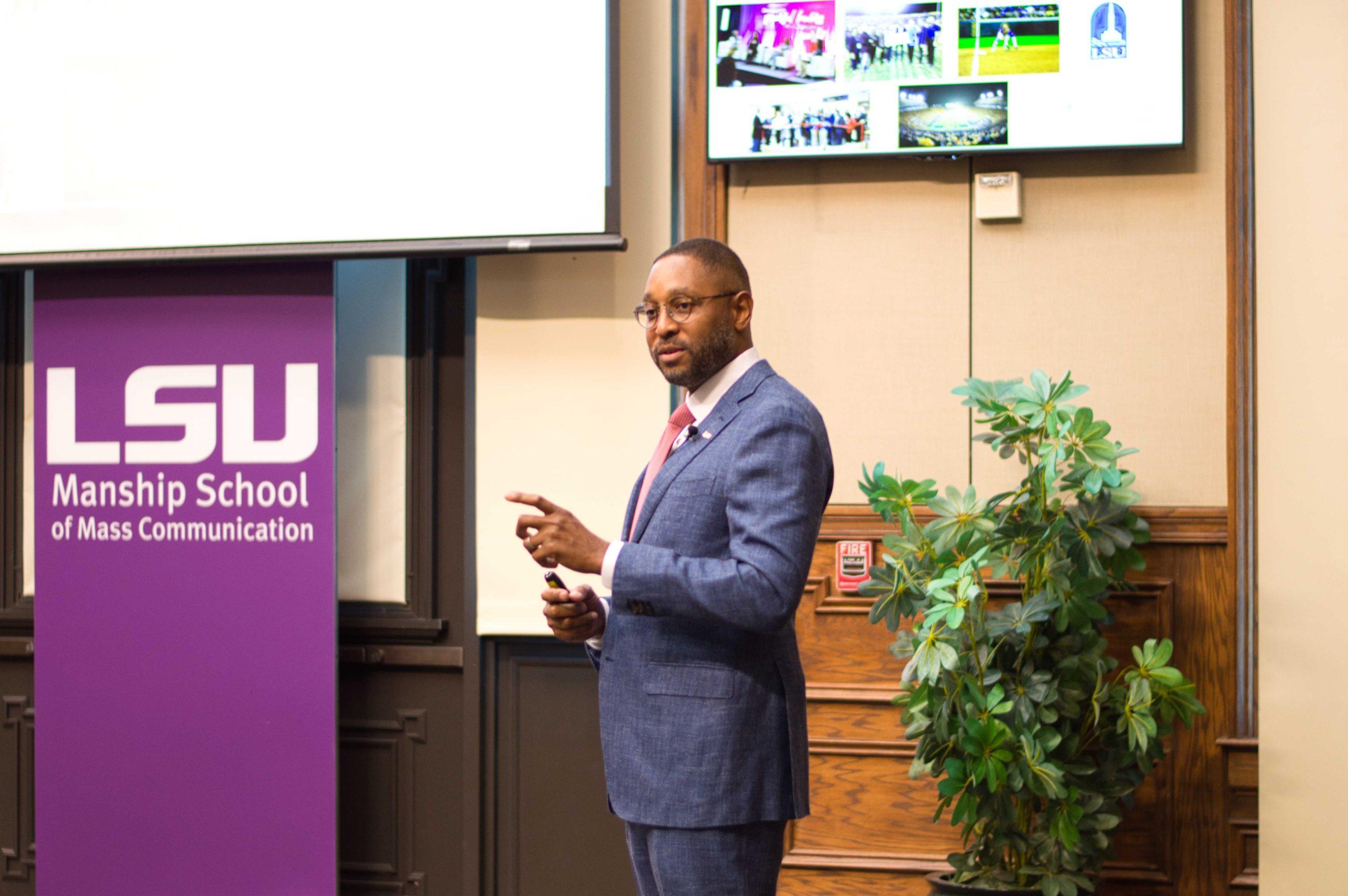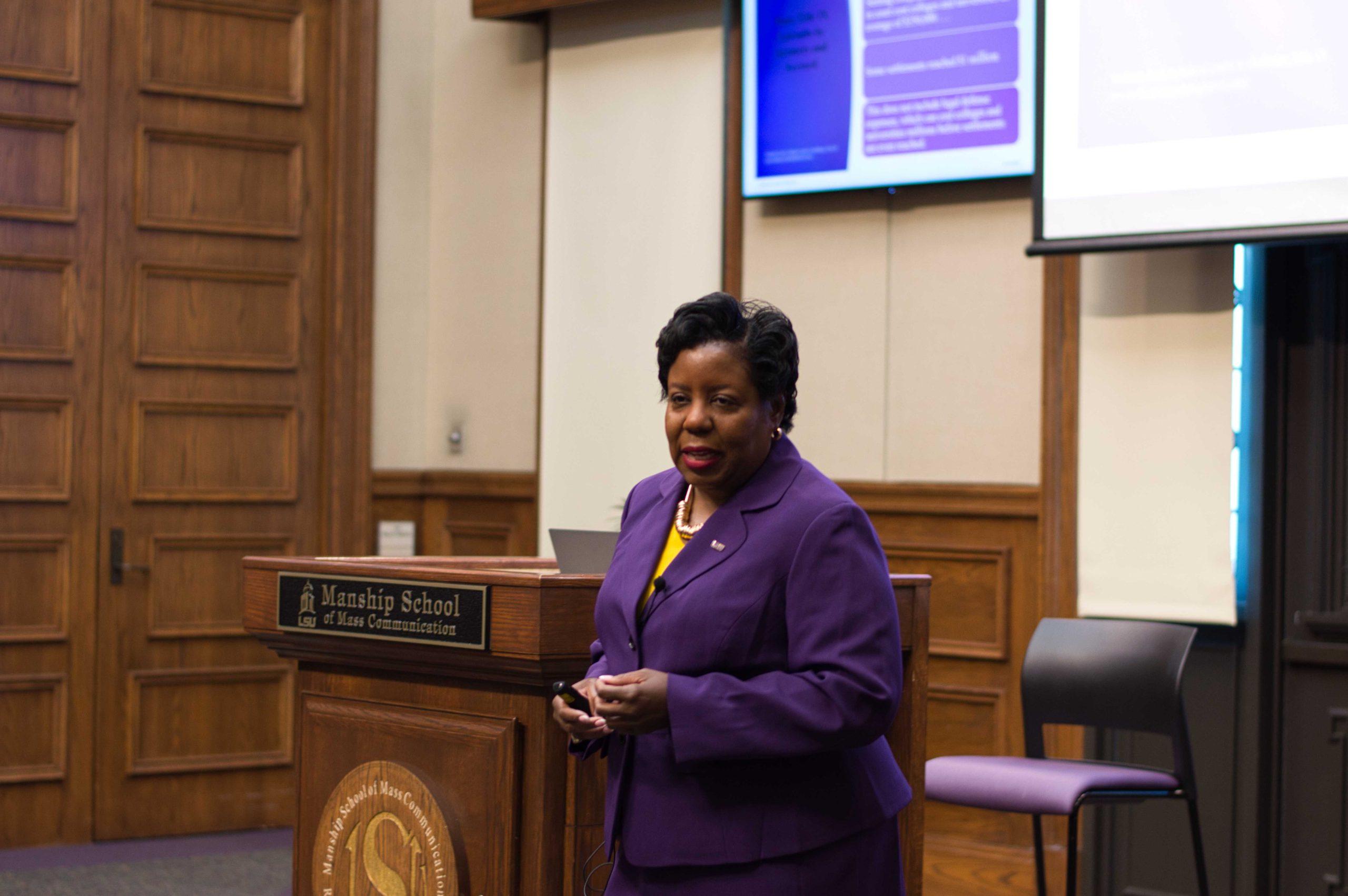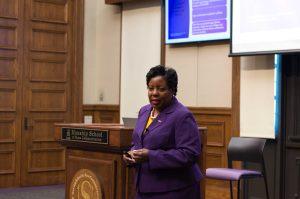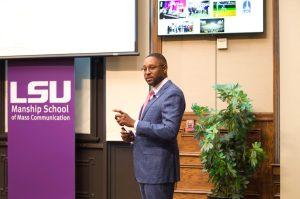The candidates for the new vice president of inclusion, civil rights and Title IX held their open forums between Tuesday and Thursday.
Each candidate had time to present their background and experience and then took questions from the audience.
Tanya Lowery was the first candidate to present during her forum on Tuesday.
Lowery currently works for the University of Texas Permian Basin as the chief compliance officer and the interim chief diversity officer.
UTPB has less than 8,000 students while LSU has over 35,000. Although UTPB is a small campus, Lowery does have experience in handling larger universities. She previously worked for Oklahoma State University as the Title IX Coordinator and Equal Opportunity Specialist.
Lowery has a Ph.D. in higher education administration from University of Texas. Lowery is a trained investigator in Title IX, equal opportunity and general compliance. She said her personal experience with her own mother’s disability has increased her awareness for accessibility.
Todd Manuel held his forum on Wednesday, and he is the only candidate without higher education experience.
Manuel currently works as an executive with the Edison Electric Institute. He previously served as the director of organizational health and diversity at Entergy Corporation.
Manuel has led corporate-wide initiatives for over 13,000 employees. These initiatives included diversity, sexual harassment and discrimination policies, and racial and gender disparities. He helped create employee resource groups to advance issues for the stakeholders and the company. Manuel said there were groups for women, veterans, the LGBTQ community, and many others.
He said he also aided in implementing the Women’s Leadership Council. Manuel also worked on the litigation team for Entergy where he represented the company’s interests in casualty and commercial matters. He was a partner at a law firm before working for Entergy.
Nicole Roberson was the last of the candidates to hold their open forum.
Roberson is the director of equal opportunity and diversity for the Texas A&M University System. She has also worked for the U.S. Department of Education Office of Civil Rights. Within this position she worked on two national initiatives.
These initiatives were on the overrepresentation of minorities in special education and the underrepresentation of minorities in gifted and talented programs.
During her time with the Dallas Area Rapid Transit as the director of diversity and equal employment opportunities, she resolved a two year backlog of complaints. She said she restructured the department, implemented new policies and retrained her investigators.
Roberson has a doctoral degree in organizational leadership and three master’s degrees in human resource management, international management, and project management.
Renaming Committee
Each candidate was asked whether they plan to revive the building renaming evaluation committee and pursue name changes for buildings.
Lowery said it is important to look at why the committee has not met recently, whether that be because of guidelines or something else.
“One of the things that I wholeheartedly believe in is having a listening tour and being able to find out exactly what the pulse is on everything that’s going on.”
Lowery also said everything cannot be taken on at once, but if it takes more urgency then it can be a priority.
Manuel said this was an important body of work happening around the country right now, not just on campuses like LSU. He said the conversations surrounding the renaming need to involve a lot of people to understand the challenges that people have with some buildings or monuments.
However, it is not something Manuel would do at the start of his time at LSU. Instead, he would engage conversations on campus and bring together leaders from faculty and students to understand the complexities of renaming buildings on campus.
Roberson said that the president of the university should be the one initiating the process, but the office would help. She did not think the campus should jump to remove names.
Robertson said that erasing the past may lead to repeating the past and advocated for creating a new narrative.
“We know that maybe slavery is a tarnishment on the American culture or history rather, but if we didn’t have so many African Americans that were brought here, we would miss out on the richness that we have today,” Roberson said. “We have Beyoncé, we have all these inventors, and those are some of the benefits.”
Title IX and Husch Blackwell
The candidates were asked to share their experience in outreach and preventive measures. Depending on the candidate, there were additional questions during the Q&A relating to Title IX and the Husch Blackwell report. Some wondered how they would ensure students could trust the office.
Lowery said she would utilize assessment data done on LSU’s campus. She also said she would focus on prevention through implementing “upstander” prevention, her term for bystander prevention that gives a nod to the courage it takes to stand up.
She also said that it is important to engage in the community and the resources they have. Lowery said that events like ‘Take Back the Night’, which is often a rally followed by a march to support victims of sexual violence and protest the violence faced by many when walking at night, and working with the campus police department would aid in bringing the community together to understand.
Manuel said he has handled discrimination cases and harassment cases in the past, and it requires a level of empathy and understanding to both the complainants and the respondents. He said the university needs to understand what type of resources it has and if those resources are actually meeting the needs of people.
To get students to trust the office, Manuel said the simple answer is engagement. He said it is important to try to enact behavioral change on the campus. He also said that it requires leadership willing to model the behavior we want to see.
Manuel said that before expanding on the recommendations made by the Husch Blackwell report, we have to understand what is happening on campus currently and be in compliance with the law. He said his first order of business would be to see what is working and address any changes if they needed to occur.
Roberson said she would implement training programs at LSU. While at the Texas A&M University System, she implemented mandatory two hour workplace trainings that are taken every two years. She said she would advocate for the same here.
Roberson said that her training programs would not be basic and that they would include follow ups. She said that participation in the trainings would be reflected in performance reviews for faculty.
While she did not know if they would be mandatory for students, she said that if they were, then students would be required to do the trainings in order to register for classes. However, she mentioned the student training would only be 30 to 45 minutes.
Roberson said that for students to gain and remain confident in the office, it starts with having a visible presence.
She said then they are going to investigate the complaint, it will be documented and questions will be answered. She also said that if a student does not feel like their complaint was handled right, she would want to hear about it.
“We’re not gonna cover it up,” Roberson said. “They have their rights. And I want that for them internally, as well as externally. When they leave, it’s not gonna be covered up. If they feel it’s being covered up, they need to know how to go higher.”
She also said that students would see her and other members of the office out at student events to build trust and build a visible presence on campus.
ADA Compliance
Several questions were brought up concerning compliance with the Americans with Disabilities Act and how to move past compliance.
Lowery was involved in fixing ADA compliances in facilities at both OSU and UTPB. She said you first have to fully assess what is going on, find out what needs to be done and then take those issues to the president of the university who can “pull those purse strings.”
She said it is important to address critical issues as soon as possible. Lowery said to move past compliance is a two-pronged process. First, they have to make sure they are following federal guidelines in order to continue receiving funding. Second, they need to make sure people are educated on the issues on campus.
“We are all in this together,” Lowery said. “And if one particular person does not have access and equity, guess what? All of us really don’t have access and equity.”
Manuel said that we have to first understand how these issues appear on campus and how they impact people daily. At the Edison Electric Institute he implemented a series of webinars that discussed diversity, equity, and inclusion. He said one of the top programs was a webinar on disability inclusion.
Manuel referred to engagement again, saying that the stakeholders need to be brought to the table. He said they need to be a part of the solution and process.
Roberson mentioned that while the school may not have the means to immediately start reconstructing a building, other steps can be taken to make programs accessible for students. She said programs could be moved to more accessible buildings. She also said policy needs to be written at a system level, so that everyone is on the same page.
One Office
The candidates were asked to think about the synergies involved in having an office that handles inclusion, civil rights and Title IX report to the same vice president.
During her presentation, Lowery compared the office to the best piece of cake. She said that cake is only the best because of all the ingredients that came together to make it. Lowery said the ingredients themselves can stand alone, but they are better when they come together to make the cake.
Manuel said that having the office as one would enhance knowledge sharing and decision making. During his presentation, Manuel said that the issues these offices deal with are complex and changing each day, so having one office helps manage everything.
He said having a single office can drive engagement, increase operational effectiveness and innovation, enhances LSU’s brand recognition and reputation and sustain LSU’s values.
Roberson said that no piece of the office will be forgotten or underserved. She said that these offices need to work together to function fully. She said that they all have a common goal: to provide a discrimination-free workplace for everyone.
After their sessions, each candidate was interviewed over two days by the search committee. This is the evaluation process of the search process. After this, the committee will move to the selection process in which they have more interviews and campus visits along with their recommendations to the president.
There is one student member on the search committee, Angel Upshaw. She is the co-president for Tigers Against Sexual Assault. General student body members can voice their opinions through the candidate survey open until midnight on Sunday. The survey can be found through the vice president for inclusion, civil rights and Title IX search website.
‘We’re not gonna cover it up’: meet the candidates for VP of inclusion, civil rights and Title IX
June 25, 2022



